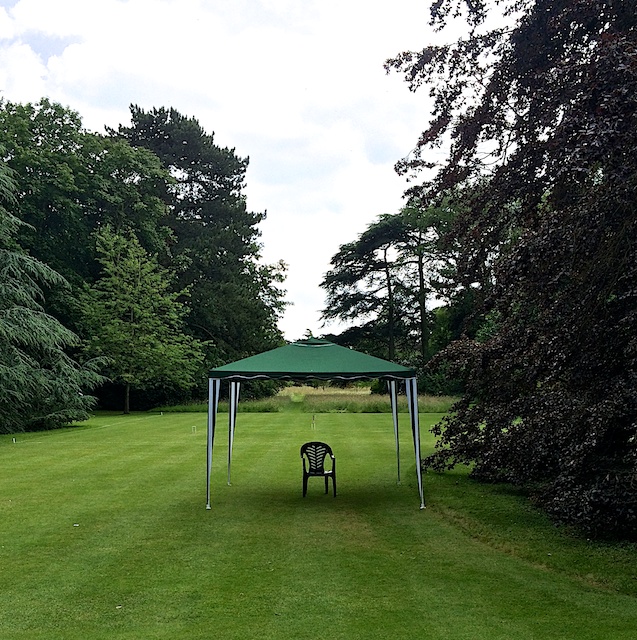The garden, Leckhampton, Friday afternoon.
Bletchley Park and the erosion of the freedoms it was set up to defend
This morning’s Observer column.
It’s terrific that Bletchley Park has not only been rescued from the decay into which the site had fallen, but brilliantly restored, thanks to funding from the National Lottery (£5m), Google (which donated £500,000) and the internet security firm McAfee. I’ve been to the Park many times and for years going there was a melancholy experience, as one saw the depredations of time and weather inexorably outpacing the valiant efforts of the squads of volunteers who were trying to keep the place going.
Even at its lowest ebb, Bletchley had a magical aura. One felt something akin to what Abraham Lincoln tried to express when he visited Gettysburg: that something awe-inspiring had transpired here and that it should never be forgotten. The code-breaking that Bletchley Park achieved was an astonishing demonstration of the power of collective intelligence and determination in a quest to defeat the gravest threat that this country had ever faced.
When I was last there, the restoration was almost complete, and I was given a tour on non-disclosure terms, so I had seen what the duchess saw on Wednesday. The most striking bit is the restoration of Hut 6 exactly as it was, complete with all the accoutrements of the tweedy, pipe-smoking genuises who worked in it, right down to the ancient typewriters, bound notebooks and the Yard-O-Led mechanical pencil that one of them possessed.
Hut 6 is significant because that was where Gordon Welchman worked…
Tribes with flags
I have mixed feelings about the NYT‘s Tom Friedman, but sometimes he does hit the target. This morning he has a bleak assessment of the options for Syria and Iraq, and indeed for the Middle East generally. In a nutshell, he argues that
a unified Iraq and a unified Syria can no longer be governed vertically [i.e by dictators] or vertically [i.e. “by having the different sections, parties and tribes agree on social contracts for how to live together as equal citizens who share power”]. The leaders no longer have the power to extend their iron fists to every border, and the people no longer have the trust to extend their hands to one another.
His conclusion is bleak:
It feels both too late and too early to stop the disintegration — too late because whatever trust there was between communities is gone and Maliki is not trying to rebuild it, and too early because it looks as if Iraqis are going to have to live apart, and see how crazy and impoverishing that is, before the different sects can coexist peacefully.
He’s right. I’ve been thinking a lot recently about Ralf Dahrendorf and his views about how complex and fragile a plant democracy is, and how it can only grow and flourish in complex soils which take a long time to evolve. Friedman sees it that way too:
Pluralism came to Europe only after many centuries of one side or another in religious wars thinking it could have it all, and after much ethnic cleansing created more homogenous nations. Europe also went through the Enlightenment and the Reformation. Arab Muslims need to go on the same journey. It will happen when they want to or when they have exhausted all other options. Meanwhile, let’s strengthen the islands of decency — Tunisia, Jordan, the United Arab Emirates, Lebanon and Kurdistan — and strengthen our own democracy to insulate ourselves as best we can.
Well, yes but… A futile but sobering counterpoint to that would be to reflect on how so much of this Middle Eastern mayhem is a legacy of European colonialism, and of the way the soi-disant ‘peacemakers’ in Versailles created all these fake and untenable countries by drawing arbitrary lines on maps.
The canopy
Stand by for a deluge of Magna Bollocks
We are about to be deluged with establishment cant about Magna Carta, on account of its approaching 800th anniversary. A splendid antidote to this is provided today by Anthony Barnett of openDemocracy.net.
any authentic celebration of Magna Carta would be a sober, serious challenge to the status quo, unlike the celebratory website proclaiming “The Magna Carta has been the most valuable export of Great Britain to the rest of the world”. For all its eulogies it cannot bring itself to reproduce the actual Magna Carta itself, let alone the Charter of the Forests.
This is not to make an anachronistic claim that the Magna Carta was ‘progressive’. It was a feudal deal. It is the myth that matters: an inspiration to challenge arbitrary, despotic power; a seed for a democratic constitution; a right to be ruled by law; and even, thanks to its companion Charter, a claim that land be held in common not enclosed for profit.
To snuff out all such radicalism, the official celebrations of its 800 years will be funded twelve months hence by £1million from chancellor George Osborne and we will be palmed off with an assortment of Magna Bollocks, to express gratitude to Britain’s ruling order gifting liberty to the globe.
That is how Margaret Thatcher saw it after 1989. Unable to prevent the unification of Germany she planned to use a Paris Summit on European security in November 1990 to launch a Magna Carta for Eastern Europe. I attended the press conference, in the ballroom of the British Embassy and asked her, “Prime Minister, why, when you called upon this Summit to entrench rights across Europe, do you not agree with Charter 88 that we should have entrenched rights in the United Kingdom?” She replied, “We are in this Summit to get rights way across the European Divide… to call for the Community to extend democracy to other countries…”.
Within three days, British democracy such as it was, forced Thatcher to resign. Let’s hope that the curse of the Magna Carta brings down our present bunch of manipulative populists. Eight hundred years of rule by Barons is enough. It is the peoples’ turn. We do not just need a Magna Carta for the World Wide Web as Tim Berners-Lee has called for, we need a democratic constitution: to govern Parliament now that it has been corrupted and suborned, to define our relations with Europe and secure our claims to privacy, liberty and, in a digital age, our metadata.
Right on. Earlier in the piece, Barnett recalls the time that Professor Peter (now Lord) Hennessy, who taught modern British political history at Queen Mary College, to meet the then Cabinet Secretary, Sir (now Lord) Robin Butler.
One of the students innocently asked what is the British constitution. Butler answered, “something we make up as we go along”.
“Who is this ‘we’ that makes it up?” asks Barnett.
It is certainly not ‘We, the people’. When Sir Robin was speaking, he was part of the last remnants of the old Establishment. Now the British Constitution is something GCHQ makes up, as it goes along.
The Internet of Things: it’s a really big deal. Oh yeah?
This morning’s Observer column. From the headline I’m not convinced that the sub-editors spotted the irony.
Like I said, everybody who is anybody in the tech business is very turned on by the IoT. It’s going to make lots of money – oh, and it’ll change the world, too. Of course there are some boring old creeps who keep raining on the parade. Spoilsports, I call them. There are, for example, the “security” experts who think that the IoT opens up horrendous vulnerabilities for our networked society. Hackers in Azerbaijan could get control of our “smart” electricity meters and shut down the whole of East Anglia with the click of a mouse. Pshaw! As if the folks in Azerbaijan even knew there was such a place as East Anglia. Or some guy in Anonymous could remotely jam the accelerator in your car so that you drive into your garage at 130mph even when you have your foot firmly on the brake. As if!
That’s why it’s *sooo* annoying when the media publicise scare stories about security lapses involving connected gadgets. I mean to say, how could TRENDnet have known that its “secure” security webcams weren’t really secure at all? It’s not its fault that a hacker broke into the SecurView camera software and told other people how to do it. The result, according to the US Federal Trade Commission, was that “hackers posted links to the live feeds of nearly 700 of the cameras. The feeds displayed babies asleep in their cribs, young children playing and adults going about their daily lives”.
This is *so* unfair. Poor old TRENDnet makes security *cameras*. Why should it know anything about internet security?
The Hedgehog in the Fog
Tired of the World Cup? Watch this instead.
James Joyce: the decisive moment
As Bloomsday approaches, references to James Joyce in the more cerebral end of the media crop up with increasing frequency. Today, I stumbled (courtesy of The Irish Times) on a fascinating literary discovery — an unpublished Introduction to an edition of Joyce’s great collection of short stories, Dubliners written by Anthony Burgess who in addition to being an accomplished novelist, critic, composer and all-round polymath was one of my colleagues on the Observer Arts pages back in the 1980s.
There are fifteen stories in Dubliners, fourteen of which are memorable and one of which — “The Dead” is a masterpiece. It’s the story of a New Year’s Eve party in the Dublin home of a pair of cultivated, musical, bourgeois spinsters. It is, writes Burgess, “a convivial evening in the Irish manner, full of song, quadrilles, bottled beer and food”. The central characters in the story are the spinsters’ nephew, Gabriel Conroy, and his wife Gretta.
Burgess sees Gabriel as “a sort of James Joyce, though plumper and more complacent”.
He is a literary man, a college teacher, contributor of a bookish column to the Dublin Daily Express. He is Europeanised, unsympathetic to Ireland’s patriotic aspirations, conscious that his own culture is deeper and wider than that which surrounds him in provincial Dublin. He has married a girl of inferior education – “country cute” was his mother’s description of her – but he does not despise her.
Gretta is a quiet beauty, and Gabriel is a possessive husband. Because they live some way out of the city, they have booked a hotel room for the night. As they go to the hotel in the early hours, a wave of desire comes over him: the possessive wants to possess. But Gretta is distracted. Towards the close of the party the tenor Bartell D’Arcy had sung a song called The Lass of Aughrim, and she is thinking about the song. A young boy she once knew in Galway — and who had been in love with her — used to sing it. His name was Michael Furey, and he died tragically young.
Gabriel carelessly asks whether he died of consumption, but Gretta replies, “I think he died for me,” she replies, weeping.
This is how Joyce writes it:
“It was in the winter,” she said, “about the beginning of the winter which I was going to leave my grandmother’s and come up here to the convent. And he was ill at the time in his lodgings in Galway and wouldn’t be let out, and his people in Oughterard were written to. He was in decline, they said, or something like that. I never knew rightly”.
She paused for a moment, and sighed.
“Poor fellow,” she said. “He was very fond of me and he was such a gentle boy. We used to go out together, walking, you know, Gabriel, like the way they do in the country. He was going to study singing only for his health. He had a very good voice, poor Michael Furey.”
“Well; and then?” asked Gabriel.
“And then when it came to the time for me to leave Galway and come up to the convent he was much worse and I wouldn’t be let see him so I wrote him a letter saying I was going up to Dublin and would be back in the summer, and hoping he would be better then.”
She paused for a moment to get her voice under control, and then went on:
“Then the night before I left, I was in my grandmother’s house on Nun’s Island, packing up, and I heard gravel thrown up against the window. The window was so wet I couldn’t see, so I rad downstairs as I was and slipped out the back into the garden and there was the poor fellow at the end of the garden, shivering.”
“And did you not tell him to go back?” asked Gabriel?
“I implored him to go home at oncw and thold him he would get his death in the rain. But he said he did not want to live. I can see his eyes as well as well! He was standing at the end of the wall where there was a tree”.
“And did he go home?” asked Gabriel.
“Yes, he went home. And when I was only a week in the convent he died and he was buried in Oughterard where his people came from. O, the day I heard that, that he was dead!”
She stopped, choking with sobs, and, overcome by emotion, flung herself face downwards on the bed, sobbing in the quilt. Gabriel held her hand for a moment longer, irresolutely, and then, shy of intruding on her grief, let it fall gently and walked quietly to the window.
What follows is one of the most moving passages in the whole of Joyce’s work. It was beautifully captured in John Huston’s magnificent film adaptation of the story. This afternoon I found a clip of that closing scene.
Anthony Burgess thinks that this wonderful short story is the pivotal moment in Joyce’s development as an artist.
“The complex of emotions that now takes possession of Gabriel’s soul”, he writes,
requires more than the technique of realistic fiction for its expression. The Joyce we meet now is not the young chronicler of the earlier Dublin lives. We are in the presence of the author of Ulysses. As Gabriel analyses his tepid little soul, we see that his name and that of his long-dead rival have taken on a terrible significance: Gabriel the mild angel, Michael the passionate one; that dead boy, possessed of an insupportable love, was rightly called Furey.
Gabriel becomes aware of the world of the dead, into which the living pass. That world goes on with its own life, and its purpose is to qualify, literally to haunt, the world of those not yet gone. The living and the dead coexist and have strange traffic with each other. And there is a sense in which that, dead, Furey is more alive, through the passion that killed him, than the living Gabriel Conroy with his scraps of European culture and his intellectual superiority.
Meanwhile, in the all too tangible world of Dublin, the snow is coming down. More, it is, perhaps impossibly, “general all over Ireland”, and it serves Joyce’s symbolic intent more than a concern with meteorological plausibility. For “the snow is falling faintly through the universe and faintly falling, like the descent of their last end, upon all the living and the dead”.
It is real snow, but it is also a metaphysical substance that unites humanity in time, not space. Space becomes itself a symbol. When Gabriel thinks of setting out on his “journey westward” he is to take not a train but a time machine. The west is where passion took place and a boy died for love: the graveyard where Michael Furey lies buried is, in a sense, a place of life.
“The Dead” is magic”, Burgess concludes, “whereas the preceding stories are merely literature”.
Yep.
Everything you need to know about football in a single picture
Oliver Stone to do the Edward Snowden story
From a Guardian Press Release.
Academy Award-winning director Oliver Stone and his long-time producing partner Moritz Borman today announced they have purchased the rights to ‘The Snowden Files, The Inside Story of the World’s Most Wanted Man’, published by Guardian Faber and written by Guardian journalist Luke Harding.
Stone will write and direct the film, drawing from Harding’s critically-acclaimed account of events surrounding the Guardian’s Pulitzer Prize-winning reporting of the disclosures provided by Edward Snowden, as well as additional materials from the Guardian’s US team who broke the story.
Stone has commenced writing the screenplay and Borman is fast-tracking it as a major European co-production to start filming before the end of the year. Harding and other Guardian journalists will also act as exclusive production and story consultants.
Hmmm… Hope it’s better than his JFK film.



